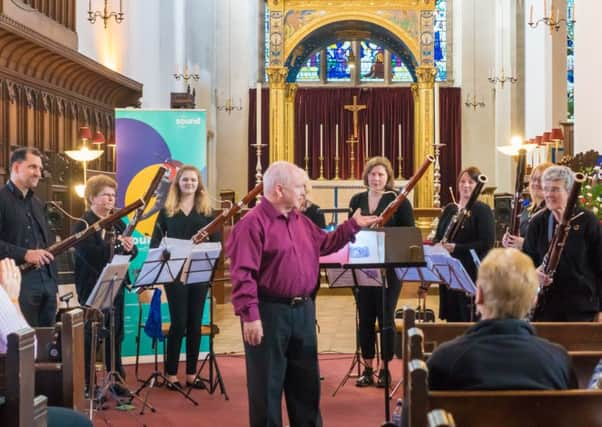Interview: composer Edward McGuire prepares to mark his 70th birthday in style


The composer and flautist, who has just celebrated his 70th birthday, is looking forward to celebrations including the premiere of his Three Donne Lyrics for Paisley Abbey Choir and bass flute (played by Ewan Robertson) on 4 March, while plans are afoot for a concert on 16 June in St Silas Church, during Glasgow’s West End Festival, which will showcase a string quintet version of his viola concerto, his Celtic Knotwork for flute trio and other compositions.
“Eddie”, as he is universally known, is hugely well-regarded, despite having ploughed something of a lonely furrow stylistically, particularly in his earlier career, not least for his pioneering straddling of contemporary classical and traditional music; indeed, he regards his decades of playing with the Whistlebinkies folk band as an integral part of his musical development.
Advertisement
Hide AdThese days such colloquy between “art” and folk music is much more acceptable. Back in 1971, however, when the Glasgow-born McGuire returned to his native city after four years at the Royal Academy of Music then a year studying in Stockholm, “I had missed out on a generation of Glasgow music-making, but I caught up rapidly when I met the Whistlebinkies”. His “apprenticeship” with the group brought him back down to earth – as did his parents’ reaction to the music he was playing under the revisionist influences of music college. “It took me a while to get back into the essence of what I really loved in music.”
McGuire also brought from student politics a Marxist philosophy that still grounds his music-making and union activity – he returned in time for the UCS shipyard occupation, composing a piece for four saxophones which he presented to Jimmy Reid.
Forty years on, his music remains quintessentially modern, mercurial, rooted and lyrical. “I’m still trying to recapture the thrill and amazement at music from my first steps in discovering harmony and melody as a young teenager,” he says. A boost came when his piece for solo violin, Rant, won the 1978 Carl Flesch International Violin Competition. Around the same time, he incorporated Highland bagpipes into an orchestral commission from Radio 3. The powerful result, Calgacus, was broadcast from Glasgow University’s Bute Hall; 20 years later a Proms performance – featuring Whistlebinkies piper Robert Wallace – was recorded and selected for BBC Music Magazine’s “Very Best of the BBC Orchestras” CD.
Other milestones include his ballet music Peter Pan, a major success with Scottish Ballet which went on to be performed by Hong Kong Ballet, and, for the Paragon Ensemble, The Loving of Etain, based on Celtic legend. Despite the success of two albums of his smaller-scale pieces issued by Delphian Records, Music for Flute, Guitar and Piano and, with the Red Note Ensemble, Entangled Fortunes – both Gramophone magazine editor’s choices – he still aspires to see some of his larger-scale pieces recorded. He has a recording of Peter Pan, made at his own expense, but needs funding to issue it. Similarly he’s in touch with Mode Records of New York about releasing a recording of Scottish Circus, an extraordinary improvisation he and the ’Binkies commissioned from John Cage and performed during the 1984 Edinburgh Festival.
Another non-recorded landmark is his 1998 Viola Concerto for the influential player James Durrant. A chamber version will be revived for the June concert, to be played by Durant’s protégé, Scott Dickinson, principal viola with the BBC SSO.
The concert, with other guests including guitarist Philip Thorne MBE, is being organised by fiddler Alastair Savage, who also habitually crosses the classical-traditional divide. “Eddie represents a diverse world of music, he says. “Certainly in my lifetime I can think of no one else in Scotland who has managed to compose for both the orchestral classical world and the folk music world with such equal prolificacy and a seamless transition between each.”
Three Donne Lyrics, plus music by Frank Martin and Duruflé, will be performed at Paisley Abbey on 4 March, www.paisleyabbey.org.uk